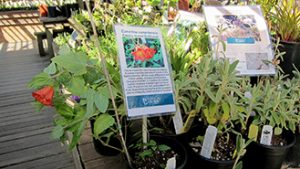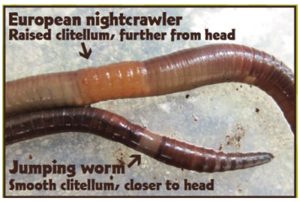Bulletin #2518, Best Practices for Plant Sale Donors and Buyers in Maine
Developed by Tori Jackson, Extension Professor of Agriculture & Natural Resources, Lynne Holland, Horticulture Professional, University of Maine Cooperative Extension, and Naomi Jacobs, Master Gardener Volunteer
Reviewed by Katherine Garland, Horticultural Professional, University of Maine Cooperative Extension. Updated by Gary Fish, State Horticulturist, Maine Department of Agriculture, Conservation and Forestry
For information about UMaine Extension programs and resources, visit extension.umaine.edu.
Find more of our publications and books at extension.umaine.edu/publications/.

What passionate gardener hasn’t slammed on the brakes at the sight of a spring plant sale by the side of the road? Sales of donated plants are a major source of income for garden clubs, land trusts and conservation groups, as well as an exciting way for plant lovers to acquire new treasures at a modest cost. Unfortunately, plants dug from home gardens can present challenges.
A big challenge is that not everyone who donates a plant knows exactly what they are donating. As of 2024, there are sixty-three plants that the State of Maine has prohibited from sale or distribution due to their invasive nature. Review the Invasive Plant Do Not Sell List before every plant sale. If a donator cannot name what they are donating then that donation should be reviewed by an expert or not taken.
Another challenge is that volunteer dug plants could transmit problem organisms such as Jumping worms (Amynthas agrestis), European fire ants (Myrmica rubra), and winter moths (Operophtera brumata), as well as invasive plants like black swallowwort (Cynanchum louiseae). Several Maine plant sales have been discontinued in recent years due to such concerns. Here are steps you can take to reduce the chance of spreading invasive pests through this beloved spring tradition.
Best Practices for Donors
- Do not offer any plants the state of Maine has prohibited from being sold due to their invasive nature. Review the State of Maine’s Invasive Plant Do Not Sell list before every plant sale. Similarly, many plants not listed as invasive are still troublemakers. If a plant tends to take over the garden and is hard to contain, it’s probably best not to share it with others.
- Use new, sterile soil and sterilized pots to prevent transmission of seeds, disease, and insect pests, which may be present as cocoons, larvae, or adults.
- Sterilize tools such as trowels and shovels. A 10% chlorine solution works well.
- Before you propagate, inspect plants carefully to screen out those with any sign of pests or disease.
- Pot up rooted cuttings rather than divisions whenever possible and always use new potting soil, not garden soil.
- If you do donate divisions, rinse the roots before potting, and manually remove the roots of invasive plants such as black swallowwort or bindweed. This is labor-intensive but can be effective if done thoroughly.
- Work with your group to ensure that all donors follow best practices. Perhaps the group could make bulk purchases of new pots and potting soil, for instance, to reduce the cost to donors.
- Know what pests are in your area, if you live in an area where pests are known to be established, ask your group to discuss whether the sale tradition should be suspended or discontinued. For additional information view the resources below:
- Winter moth
- 2005 European fire ant map
- Jumping worm map (updated in 2023)
- If your traditional plant sale offering seems to be impacted by these pests, consider adding locally grown annual seedlings to the offering. Vegetable seedlings have been successful in some sales in this way. This also supports local growers.
- Consider an educational garden event or garden tour instead of a plant sale.
- Finally, the earlier the plants are dug up, divided, and potted, the less trauma the plants will experience, and the more happily they can settle into their new homes. Strong, healthy plants are more resistant to disease and less attractive to many insect pests.
Best Practices for Buyers
- If you live in an area where a pest is known to have taken hold, ask the sellers about whether their donors are required to follow best practices.
- Inspect plants carefully before buying.
- Rinse the roots before planting, unless you are confident that sellers have used sterile media and other best practices.
- Be aware of the invasive plants prohibited for sale in the state of Maine. Some plant sales may unintentionally be offering these items, so it’s important to be an informed buyer.
Best Practices for Organizers
- Get the word out about your plant sale so that no plant remains an orphan. Social media, local newspapers, and local calendars all have deadlines that vary from a few days to several weeks before an event, so plan ahead.
- An organized sales area that leads the buyers in one direction through the sale is not only efficient but also easier to manage, whether your sale is live or presale with pick-up.
- Grouping plants for sale together by type (annual, perennial grasses, etc) and light conditions is helpful to shoppers.
- Learn from other successful plant sales in other parts of the country.
- Learn for those who sell plants professionally the top 10 tips for boosting impulse sales.
Additional Resources
1. Maine Invasive Plants Banned for Sale or Distribution
The Maine Department of Agriculture, Conservation and Forestry has adopted rules (DOC) that prohibit the sale of 33 invasive plants. sale of 33 invasive plants. In January 2024 thirty additional plants and one plant of special interest were added to this list. The State of Maine’s Do Not Sell Plant List is organized with both Latin and common names and is the authoritative guide on this topic.
2. Jumping Worm (Amynthas agrestis)
In 2023, Jumping worms were found to be widespread in Maine. Part of the increase in this pest can be attributed to increased awareness but it was also discovered that they spread through plants and soil amendments and the wet growing season made them more visible and plentiful. They damage forest habitats by gobbling up the organic layer which stresses trees, understory plants, and the wildlife that depend on the leaf litter for survival, so their spread must be curbed as much as possible. The Curtis Library in Brunswick recorded a presentation about Jumping Worms by Gary Fish, State Horticulturist, Maine Department of Agriculture, Conservation and Forestry on Feb.4, 2024, as part of their Growing Literacy Series. The video, “Growing Literacy: Invasive Jumping Worms”, can be found on the Curtis Library’s Vimeo website.
3. European Fire Ant (Myrmica rubra)
The European fire ant is established in many areas along Maine’s coast and has been observed as far inland as Bangor. It endangers native ants; the aggressive swarming behavior and nasty stings can render an area unusable by humans.
Bulletin #2551, European Fire Ant: Management for Homeowners
4. Winter Moth (Operophtera brumata)
Winter Moth is found in coastal Maine from Kittery to Bar Harbor. Its cocoons are in the soil from June to November. The voracious larvae defoliate trees and shrubs.
5. Black Swallowwort (Cynanchum louiseae)
Much of Cumberland County has a problem with this severely invasive vine, which can alter bird habitats and choke out native plant species including milkweed, the preferred host of the monarch butterfly. Localized stands are found elsewhere in the state.
See Maine Natural Areas Program Black Swallowwort.
6. Maine Department of Agriculture, Conservation and Forestry Invasive Plants
Information in this publication is provided purely for educational purposes. No responsibility is assumed for any problems associated with the use of products or services mentioned. No endorsement of products or companies is intended, nor is criticism of unnamed products or companies implied.
© 2021, 2024
Call 800.287.0274 (in Maine), or 207.581.3188, for information on publications and program offerings from University of Maine Cooperative Extension, or visit extension.umaine.edu.
In complying with the letter and spirit of applicable laws and pursuing its own goals of diversity, the University of Maine System does not discriminate on the grounds of race, color, religion, sex, sexual orientation, transgender status, gender, gender identity or expression, ethnicity, national origin, citizenship status, familial status, ancestry, age, disability physical or mental, genetic information, or veterans or military status in employment, education, and all other programs and activities. The University provides reasonable accommodations to qualified individuals with disabilities upon request. The following person has been designated to handle inquiries regarding non-discrimination policies: Director of Equal Opportunity, 5713 Chadbourne Hall, Room 412, University of Maine, Orono, ME 04469-5713, 207.581.1226, TTY 711 (Maine Relay System).


